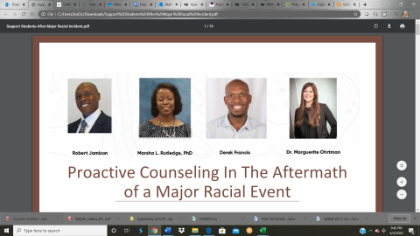"Not everything that is faced can be changed, but nothing can be changed until it is faced." This quote by James Baldwin reflects the current climate of our dear country. Leaders, educators, and individual citizens are all being faced with harsh realities and crucial decisions. Their beliefs concerning "Black Lives Matter" and the impact that systemic racism has had on our society, especially our educational system, are under scrutiny and being challenged. Regardless of where you are on this issue, the truth is that change is on the horizon. As the re-imagining of schools, academic processes, and in-class experiences are being discussed across America because of COVID-19, now is the time to really begin dismantling inequities and systemic policies and procedures that have negatively impacted Black students and students of color.
As a result, Dr. Marsha Rutledge, Assistant Professor of Counselor Education, along with three of her colleagues, hosted a webinar titled: Proactive School Counseling in the Aftermath of Major Racial Incidents. We were able to provide for an open and honest conversation about systemic racism and how it shows up in schools. We were also able to share with our listeners the importance of social justice and advocacy work, how to move from allyship to accomplices, and more. The response has been amazing, with over 5,300 registered, 2,800 attended in real-time, and Facebook Live registering above 15,000 views. This indicates that there are educators who are ready for change. With no set instructions or a guide book to follow on how to have these difficult conversations, we must work hard to support our students AND school counselors of color through the issues that are plaguing our country, especially since there are several happening simultaneously. This presentation was just the first of many. The information shared can be used to open the door toward changing the narratives that are projected throughout the institutional structures currently in place across the United States. Before concluding the presentation, she asked two critical questions that she now asks each of you who are reading this: If not now, When? If not you, Who?


